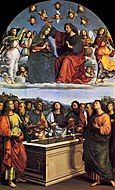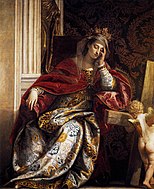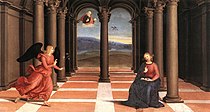Vatican Museum
Vatican Museum Twenty-two separate collections comprise the Musei Vaticani, each one more spectacular than the next. The most famous are probably the Museo Pio-Clementino, with its splendid classical sculpture; the Raphael Rooms, entire rooms painted by Raphael; the Pinacoteca (picture gallery), which contains the cream of the Vatican’s collection of medieval and Renaissance paintings; and, of course, Michelangelo’s Sistine Chapel. But there is also the ancient Egyptian exhibits of the Museo Gregoriano Egizio, as well as the Etruscan offerings of the Museo Gregoriano Etrusco. And that’s just a start.
Twenty-two separate collections comprise the Musei Vaticani, each one more spectacular than the next. The most famous are probably the Museo Pio-Clementino, with its splendid classical sculpture; the Raphael Rooms, entire rooms painted by Raphael; the Pinacoteca (picture gallery), which contains the cream of the Vatican’s collection of medieval and Renaissance paintings; and, of course, Michelangelo’s Sistine Chapel. But there is also the ancient Egyptian exhibits of the Museo Gregoriano Egizio, as well as the Etruscan offerings of the Museo Gregoriano Etrusco. And that’s just a start.
Interior:
Sculpture Museums
Sculpture museums include Museo Pio-Clementino, which houses works of Greek and Roman sculpture, Museo Gregoriano Etrusco, which houses important etruscan pieces, Museo Gregoriano Egiziano which concludes a grand collection Ancient Egypt artifacts and Museo Chiaramonti that houses important statues , stone tablets and inscriptions ,yet it is opened only by special permission, usually for reasons of study .
Sarcofagi of Helena

The Sarcophagus of Helena is the red porphyry coffin in which Saint Helena, the mother of emperor Constantine the Great, was buried (died 329).(Pio-Clementino)
Sleeping Ariadne

a Roman Hadrianic copy of a Hellenistic sculpture of the Pergamene school of the 2nd century BCE, and is one of the most renowned sculptures of Antiquity.The "Cleopatra" became the main model through which a conventional pose signifying sleep, with one elbow cocked above the head, was transmitted from Antiquity to High Renaissance and later painters and sculptors(Pio Clementino)
Belvedere Torso

The Belvedere Torso is a fragment of a nude male statue, signed prominently on the front of the base by "Apollonios, son of Nestor, Athenian", who is unmentioned in ancient literature.Legend has it that Pope Julius II requested that Michelangelo complete the statue fragment with arms, legs and a face. He respectfully declined, stating that it was too beautiful to be altered, and instead used it as the inspiration for several of the figures in the Sistine Chapel, including the Sibyls and Prophets bordering the ceiling.(Pio Clementino)
The Book of the Dead

The Egyptian Book of the Dead is a collection of spells which enable the soul of the deceased to navigate the afterlife. The famous title was given the work by western scholars; the actual title would translate as The Book of Coming Forth by Day or Spells for Going Forth by Day.The Book of the Dead was never codified and no two copies of the work are exactly the same. They were created specifically for each individual who could afford to purchase one as a kind of manual to help them after death.(Gregoriano Egyziano)
Pinacoteca Vaticana Highlights
Other Highlights of the museum:
As soon as you enter the Vatican Museum you will come across the impressive spiralling staircase designed by Giuseppe Momo in 1832. Now, as one of the most photographed staircases in the world, Momo’s staircase is famous not only for its home but for the sheer size of it. Otherwise known as the Snail Staircase.
This was a private wing built for Alexander VI (1492-1503) and decorated by Bernardo di Betto, called il Pinturicchio and his assistants. After the pontiff’s death, the work on the apartments stopped. They were only re-opened to the public at the end of the 19th century. Most of the rooms are now used for the Collection of Modern Religious Art, inaugurated by Paul VI in 1973. This Collection hosts about 600 accumulated works of painting, sculpture and graphic, through donations of contemporary Italian and foreign artists and includes works by Gaugin, Chagall, Klee and Kandinskij.
The four Raphael Rooms act as a grand entrance to the Vatican where you can’t help but be wowed as soon as you arrive. As the public part of the papal apartments, they join the museum with the Papal Palace and are famous for their frescoes by Michelangelo and Raphael. Overlooking the Belvedere courtyard they boast some of the best of the Renaissance so explore the four amazing stanze: Sala di Costantino, Stanza di Eliodoro, Stanza della Segnatura and Stanza dell’Incendio del Borgo.
Sistine Chapel
Consecrated in the late 1400s, the Sistine Chapel is one of the most visited churches in the world and is a stand-alone feature of the Vatican. Not only does Leonardo da Vinci’s masterpiece, the Last Judgement, adorn the ceiling but you can admire Botticelli’s long murals which often get overlooked. Marvel at the absolute intricacy of the fresco overhead and take a moment to appreciate this piece de resistance.
General Information:
Location: Viale Vaticano, 00165 Roma, Italy
Hours:
General Information:
Location: Viale Vaticano, 00165 Roma, Italy
Hours:
| Saturday | 9AM–4PM |
| Sunday
(Easter Sunday)
| Closed |
| Monday
(Easter Monday)
| 9AM–4PM
Hours might differ
|
| Tuesday | 9AM–4PM |
| Wednesday | 9AM–4PM |
| Thursday | 9AM–4PM |
| Friday | 9AM–4PM |
Tickets:
€ 16.00 (without online booking).
€ 8.00 (without online booking)
- Children between the ages of 6 and 18 years.
- Individual priests, men and women religious, seminarians and novices (upon presentation of valid documentation).
- Employees – in service and/or retired – of all Offices, Dicasteries and other Entities of the Holy See and/or Vatican City State (upon presentation of identity document).
The reduction can be extended to one companion only
€ 4.00 (without online booking)
Schools
€ 8.00 (without online booking)
Students

















Comments
Post a Comment